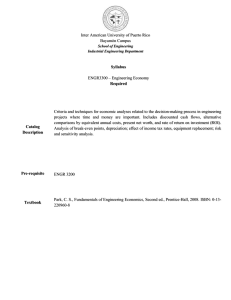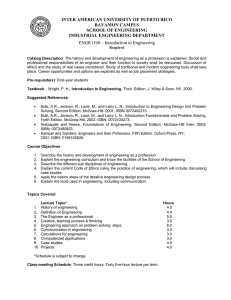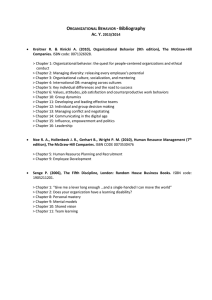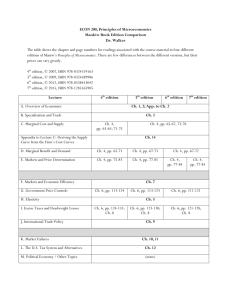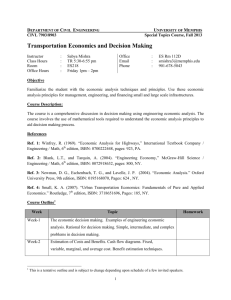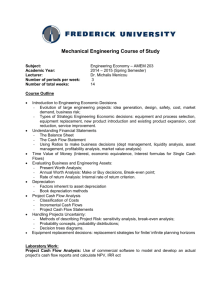INTER AMERICAN UNIVERSITY OF PUERTO RICO
advertisement
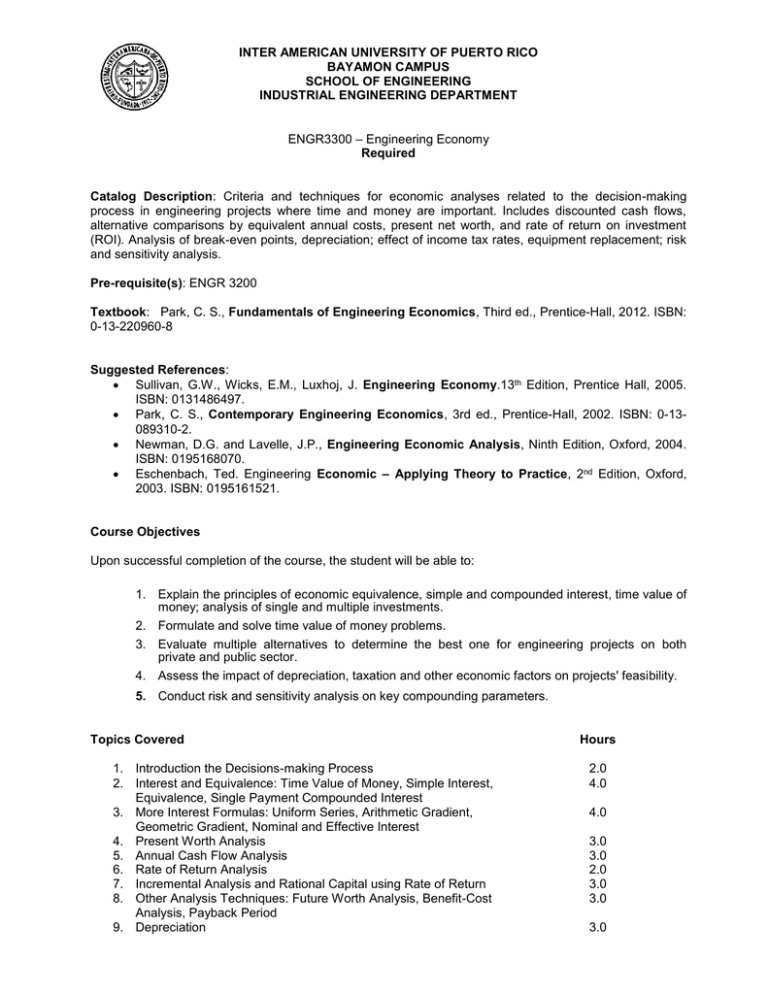
INTER AMERICAN UNIVERSITY OF PUERTO RICO BAYAMON CAMPUS SCHOOL OF ENGINEERING INDUSTRIAL ENGINEERING DEPARTMENT ENGR3300 – Engineering Economy Required Catalog Description: Criteria and techniques for economic analyses related to the decision-making process in engineering projects where time and money are important. Includes discounted cash flows, alternative comparisons by equivalent annual costs, present net worth, and rate of return on investment (ROI). Analysis of break-even points, depreciation; effect of income tax rates, equipment replacement; risk and sensitivity analysis. Pre-requisite(s): ENGR 3200 Textbook: Park, C. S., Fundamentals of Engineering Economics, Third ed., Prentice-Hall, 2012. ISBN: 0-13-220960-8 Suggested References: Sullivan, G.W., Wicks, E.M., Luxhoj, J. Engineering Economy.13th Edition, Prentice Hall, 2005. ISBN: 0131486497. Park, C. S., Contemporary Engineering Economics, 3rd ed., Prentice-Hall, 2002. ISBN: 0-13089310-2. Newman, D.G. and Lavelle, J.P., Engineering Economic Analysis, Ninth Edition, Oxford, 2004. ISBN: 0195168070. Eschenbach, Ted. Engineering Economic – Applying Theory to Practice, 2nd Edition, Oxford, 2003. ISBN: 0195161521. Course Objectives Upon successful completion of the course, the student will be able to: 1. Explain the principles of economic equivalence, simple and compounded interest, time value of money; analysis of single and multiple investments. 2. Formulate and solve time value of money problems. 3. Evaluate multiple alternatives to determine the best one for engineering projects on both private and public sector. 4. Assess the impact of depreciation, taxation and other economic factors on projects' feasibility. 5. Conduct risk and sensitivity analysis on key compounding parameters. Topics Covered 1. Introduction the Decisions-making Process 2. Interest and Equivalence: Time Value of Money, Simple Interest, Equivalence, Single Payment Compounded Interest 3. More Interest Formulas: Uniform Series, Arithmetic Gradient, Geometric Gradient, Nominal and Effective Interest 4. Present Worth Analysis 5. Annual Cash Flow Analysis 6. Rate of Return Analysis 7. Incremental Analysis and Rational Capital using Rate of Return 8. Other Analysis Techniques: Future Worth Analysis, Benefit-Cost Analysis, Payback Period 9. Depreciation Hours 2.0 4.0 4.0 3.0 3.0 2.0 3.0 3.0 3.0 10. 11. 12. 13. 14. 15. Income Taxes Replacement Analysis Engineering Cost and Cost Estimation Inflation and Deflation Uncertainty Sensitivity and Expected Value Open 3.0 3.0 2.0 2.0 2.0 2.0 Class-meeting Schedule: Three credit hours. Forty five-hour lecture per term. Evaluation Strategies 1. Exams (65%): Three partial exams (15% each) and a final exam (20%) will be scheduled early in the semester. You are expected to take the exams at the times and dates specified. All exams missed without making prior arrangements will be recorded as a zero. Midterm 1: February 20, 2013 between 11.30-12.50 Midterm 2: March 18, 2013 between 11.30-12.50 Midterm 3: April 24, 2013 between 11.30-12.50 2. Quizzes (15%): Three pop quizzes will be given. 3. Homework (5%): During the term, several homework will be assigned. Homework is intended to improve your understanding of course material by giving you an opportunity to apply the principles and techniques presented in the course. Each student must work individually. 4. Class Participation (15%): Students are expected to review the material given each class. Active participation is expected. Grading Policy Grades are reported according to the following standard grading system: A (90-100), B (80-89), C (70-79), D (60-69), F (0-59) Contribution of Course to Meeting Professional Component Three credit hours of engineering science and no credit hours of engineering design. Relationship of Course to Program Outcomes** a b c d e f g h i j k √ √ √ √ **The letter corresponds to the Program Outcomes of industrial engineering. Accommodations for Disabilities Students who require special services or assistance in carrying out academic duties must notify the Coordinator of Students with Disabilities at the Dean of Students Office at the beginning of the semester , or as soon as they become aware of their need(s). Academic fraud Dishonest conduct, fraud, plagiarism, or any other inadequate behavior regarding academic work are considered major infractions according to the Student Regulations Manual (Reglamento General de Estudiantes). Penalties for major infractions, according to the Manual, may include suspension from the University for set period of more than a year or permanent expulsion, among other disciplinary measures. Prepared by: Reinaldo Cintrón, PhD, PE Revised by; Nedim Vardar , PhD Date: 02/10/06 Date: 01/22/12
